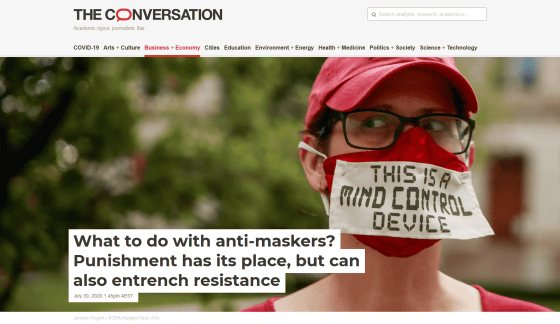How can people who don't want to wear a mask be encouraged to wear one?

To address the pandemic of the novel coronavirus infection (COVID-19), WHO has
What to do with anti-maskers? Punishment has its place, but can also entrench resistance
https://theconversation.com/what-to-do-with-anti-maskers-punishment-has-its-place-but-can-also-entrench-resistance-143456

Masks prevent the spread of virus-containing flying particles from people's mouths, and studies have shown that a certain percentage of people can mask
Some people even shoot a movie of arguing with a clerk who asks them to wear a mask and upload it to the Internet to claim their correctness. Prime Minister Daniel Andrews of Victoria, Australia, described these persons as 'horrifying' and called on people to ignore rather than argue against those who strongly refuse to wear masks.
The attitude of the Prime Minister of Andrews, who proposed to ignore it, is relatively modest, and Karl Stefanovic, the host of the morning TV show, said during a dialogue with a person who refused to wear a mask: It was a crazy belief,' 'I don't want to hear you,' and ended the interview . Stronger criticisms have also been raised on SNS, making the people who refuse to wear masks very strong.

People have a strong desire to 'punish uncooperative behavior' and can be forced to wear masks to some extent by punishing those who refuse to wear them. However, by giving strong criticism and punishment, the belief of those who refuse to wear a mask is further strengthened, and there is a risk that the conflict will intensify. As a result, Elkins and colleagues point out, 'We must strive to understand the complex sentiment of those who refuse to wear masks.'
Conspiracy theories are widespread on the Internet, such as 'The mask is a tool that the government uses to control people's minds.' It seems that people who support such conspiracy theory tend to have the belief that 'I have a good ability to intuitively know the truth' and 'I can not trust government agencies and mainstream media'. It seems easy to believe what the alternative media that advertises.
'Human beings are intuitive creatures, and distrust of authority and rebellious emotions are difficult to change with external forces,' Elkins and colleagues point out. In addition, official sources also said that the remarks were changed a lot, which in turn increased distrust of the authority.In this case, the advice of the health authorities was changed halfway, and some people became more distrustful. It is said that.
Initially, health authorities advised to 'use masks' to secure masks for medical workers, but when a sufficient supply can be secured, 'masks should be worn everyday'. I appealed. Elkins and colleagues believe that this has strengthened the belief that 'the government is not telling the truth' among those who refuse to wear masks.

'The key issue is not to change the beliefs of those who refuse to wear masks, but to change their behavior,' Elkins and colleagues pointed out, saying the question is, 'How do you get a mask to wear?' I emphasize that. Elkins and his colleagues cite the '
The final ultimatum game is an experiment in which two players are divided into a proposer and a responder, the proposer decides a share of a certain amount of reward, and the responder judges whether or not to receive the share. If the responder is satisfied with the share decided by the proposer, both parties will get a reward according to the share, and if the responder refuses, neither party will be rewarded.
Reasonably considered, responders are best to accept any amount of unfair distribution and get a little reward. However, it is also known that there is a certain percentage of respondents who refuse to accept if they actually feel uncomfortable with the distribution. This tendency was confirmed in experiments conducted on primates, and it has been shown that the 'sense of injustice' is inherent.

To control the 'feeling of injustice' that influences rational judgment, economists Erte Xiao and Daniel Houser conducted an experiment (PDF file) of some tricks in the game of ultimatum. The idea is that 'the responder can send a simple message to the proposer, 'I'm not satisfied with this share,' to express my dissatisfaction.' By adopting this rule, respondents are much more likely to respond to the offeror's offer, even if it is an unfair share.
Based on this result, Elkins and others pointed out that it is important to prepare 'a way to express your opinion' for those who refuse to wear a mask. If 'not following the rules' was the only way to express an opinion, people tend to choose not to follow the rules, but by giving others a way to express their opinions There is a high possibility that they will be sent.
Some have even devised a method of preparing a mask that can appeal 'I'm against wearing a mask' and allowing them to express their opposition while wearing the mask according to the rules. 'If you want to help people who refuse to wear masks, you have to allow them to object in other ways. Persecution and mockery increase their repulsion and resentment, and strengthen the spirit of conflict.' Elkins and colleagues said.

Related Posts:
in Note, Posted by log1h_ik







